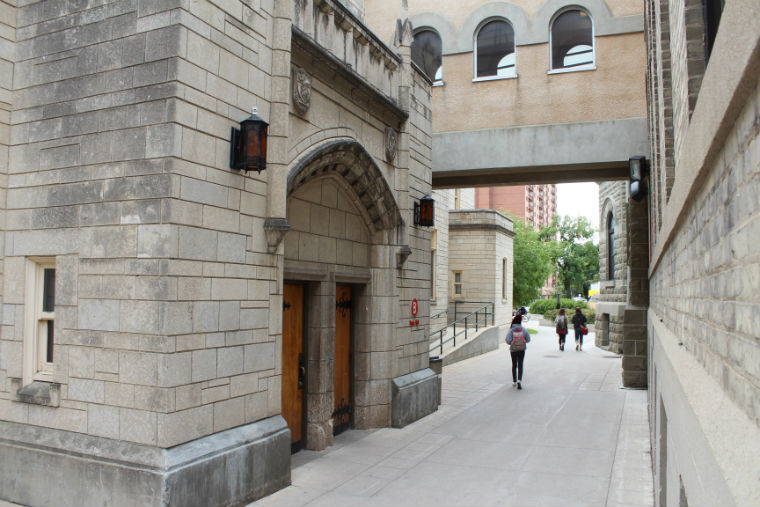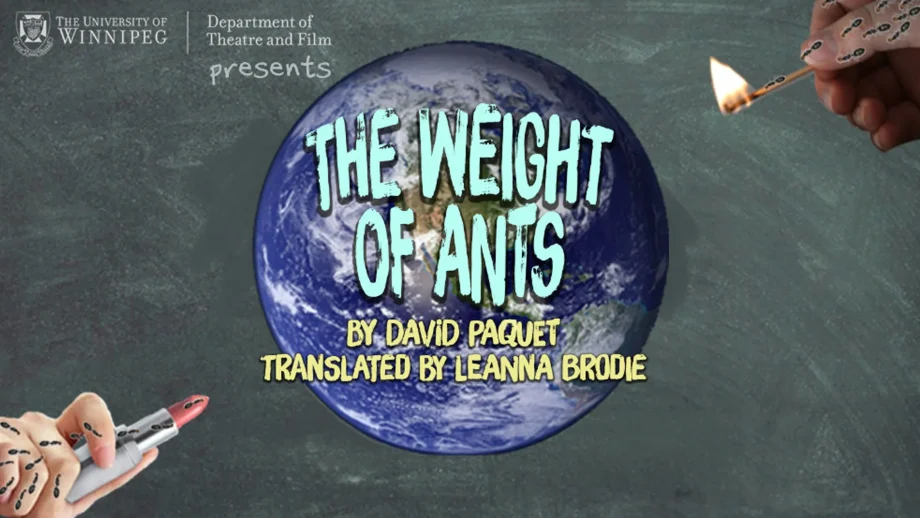 UWINNIPEG MAKES TOUGH CHOICES AS PROVINCIAL FUNDING DROPS BY 0.9%
UWINNIPEG MAKES TOUGH CHOICES AS PROVINCIAL FUNDING DROPS BY 0.9%
Operating Budget enhances student financial support, maintains academic core, reduces administration and support staff costs
WINNIPEG, MB – This evening, The University of Winnipeg’s Board of Regents approved an operating budget of $143 million for 2018-2019. The budget is balanced as required by provincial legislation. The Government of Manitoba has reduced its grant to UWinnipeg by 0.9%, in addition to a 0% freeze last year.
THE IMPACT OF ONGOING REDUCED PROVINCIAL FUNDING
Domestic students:
Tuition will rise by 6.6%. When combined with fee adjustments, the increase for students is 6.1%, an increase of $188 annually for the average UWinnipeg student (3.5 courses) or $265 for a student taking a full five-course load. This means the cost of university tuition and fees for a full-course load will increase to approximately $4,560 for a typical domestic undergraduate student.
UWinnipeg recognizes that increasing tuition costs presents a challenge for some of our students. We are responding by restructuring our student financial support to better reach those who will be hardest hit by the Manitoba government’s reduction in post-secondary funding. We are increasing the needs-based bursaries available to students as a result, up 32% from 2016-2017 levels.
International students:
With very little notice, the provincial government eliminated health insurance coverage for international students, effective September 2018. UWinnipeg will cover this cost to students until April 2019, at an estimated cost of $450,000, to allow our international students some time to transition to private insurance plans. The University is partnering with other Manitoba educational institutions to procure adequate private health insurance for international students to purchase at a reasonable cost.
For 2018-19, international tuition rates will increase at the same rate as domestic tuition.
Manitoba will continue to be one of the most affordable places to go to university in the country for both domestic and international students, even with the new tuition increases.
Personnel:
Management
Since 2015, strategic restructuring has eliminated 40% of senior administrative management positions at UWinnipeg, considerably more than the 15% requested of public entities by the provincial government. In addition, in response to budgetary challenges, the remaining senior team has accepted wage freezes in each of the past four years.
Faculty
Replacement of departing faculty is extremely limited, resulting in five fewer faculty positions compared to last year, a decrease of 1.4%. One faculty position has been reallocated to support implementation of the Indigenous Course Requirement.
Several academic administrative positions will be filled by internal candidates on an acting basis again for this fiscal year.
Staff
Eight currently filled support staff positions will be eliminated in 2018-19. This is in addition to eight positions eliminated in 2017-18. This represents a reduction of 4% of support positions over two years.
By offering staff a voluntary vacation purchase program, UWinnipeg is saving approximately $120,000 annually (employees take an average of 7.75 days off without pay).
Salaries for non-unionized staff are frozen for a second year.
Operations:
The safety and security of our students and campus is a high priority, which is balanced with UWinnipeg’s commitment to being an inclusive and welcoming community hub. The 2018-2019 budget invests in enhanced safety measures including increased patrols, closed circuit camera replacement and enhancement, additional electronic access controls in strategic locations, an interactive safety app available to the campus community, and subsidized secure locks for student lockers.
Because of innovative building retrofits, UWinnipeg spent $347,000 less on utilities in 2016 compared to 2009. This represents a 23% reduction in utility costs over this period. However, we anticipate the new carbon tax and higher electricity rates will increase the University’s energy costs going forward.
In order to balance the budget last year, UWinnipeg made the difficult decision to eliminate four athletic teams. For 2018-2019, remaining athletic programs remains stable.
UWinnipeg relies on a diversified revenue stream. The University’s English Language Program and Professional, Applied and Continuing Education (PACE) division offer high demand, market driven education options which quickly respond to employer and student needs and contribute financially to the University.
Because of strong market returns, UWinnipeg realized a one-time reduction in pension contributions this year, which will help offset the international students health insurance subsidy until April 2019.
BACKGROUND – BUDGET PRIMER
UWinnipeg’s operating grant is approximately 40 percent less funding per-student than Brandon University and the University of Manitoba. This disparity goes back decades and everyone recognizes the challenge this presents. According to information provided by the Canadian Association of University Business Officers (CAUBO), our administration costs are lower than most Canadian universities, at just 4.3%, making UWinnipeg one of the most efficient universities in the country.
We have been doing more with less for a number of years. We have already made significant reductions in management and administrative costs beyond the 15% the province has requested of public entities. Last year we eliminated some athletic programs to achieve a balanced budget.
Last year, the Manitoba government froze our operating grant for 2017-2018. The Province has also passed legislation permitting University tuition to increase by 5% plus inflation (6.6% this year) until Manitoba’s average tuition reaches that of the next lowest Western Canadian Province, which is currently about $5,600 in British Columbia, still $1,000 less than the national average. We anticipate it will take several years for Manitoba’s tuition to catch that of BC.
Tuition levels in Manitoba are the third lowest in the country. Manitoba will continue to be one of the most affordable places to go to university in the country, even with the new tuition increases. Our students pay about $2,400 less annually than the national average. UWinnipeg students taking a full five course load pay $4,560 in university fees and tuition; the average student taking 3.5 courses pays $3,261 in university fees and tuition.
Increased financial help for students in need
Above inflation increases to tuition will present additional challenges for some of our students. We are responding to that.
Currently, UWinnipeg awards over $4.7 million in scholarships, bursaries and other awards annually which is equal to 14% of total tuition and fees collected from undergrad and grad programs.
We have a number of strong supports in place for students with financial need and we will be doing more. In 2017-2018, approximately 1,100 students shared almost $1.2 million dollars in bursaries that we are able to provide primarily because of our generous private donors.
That is up significantly from previous years. That is due in part because of our partnership with IndSpire, which helps First Nations, Métis and Inuit students who have financial need.
Our 2018-2019 Operating Budget ensures there will be an additional $200,000 or more in financial help available to students who need it most. That is an increase of 16.5% from 2017-2018 and a 32% increase from 2016-2017. Our goal is to remain accessible especially to under-represented and non-traditional students.
QUICK FACTS
Overall enrolment stable with approx. 9,400 students
Domestic student enrolment expected to decline by 1% due to changing demographics (decline in 18 to 24 year olds)
International undergraduates represent 7.5% of student body (700 students), expected to rise
Indigenous enrolment is strong with 13% of new undergraduate students self-identifying; Self-identified Indigenous students (First Nations, Métis, Inuit) represent 9.5% of our overall student body, one of the strongest in Canada
Approximately 25% of students self-identify as from a visible minority (racialized) community
UWINNIPEG GRADUATE SURVEY
We also just completed a survey of our graduates two years after graduation. Some interesting highlights:
- 56% of UWinnipeg graduates reported having zero debt when they graduated
- UWinnipeg graduates have an employment rate of 95.9% two years after graduation
- UWinnipeg graduates have an average salary of $45,807 two years after graduation
- 90% of our graduates are satisfied or very satisfied with the education they received at UWinnipeg
- 90% of our graduates were employed during the academic year, and 89% were employed during the summer months while studying at UWinnipeg
This confirms what other research has shown; a University education is an important investment that keeps on giving. It provides for higher earnings throughout the course of a lifetime, and provides transferable skills that help people adapt to changes in the economy including critical thinking, research and communications skills.
INVESTING IN THE FUTURE OF MANITOBA
Investing in Manitoba universities provides strong value for individual students now, and higher rates of return in the future for all Manitobans.
Manitoba’s universities add deep value to our local economy. A 2016 analysis at the University of Winnipeg shows that $1 dollar invested results in approximately $15 dollars in economic activity.
According to Statistics Canada, a university graduate working in Manitoba made on average about $17,000 more annually than a non-university graduate in 2016. That person is earning more, spending more, and paying higher taxes to all levels of government. That has direct benefits to Manitoba’s economy.
Universities also increase productivity in the economy. Research and knowledge are the bedrock of innovation. Universities help find new ways to tackle pressing problems, often collaborating closely with industry, First Nations, community organizations and government departments.
Investing in our universities is a cost effective way to raise wages and productivity. The high rate of return on this investment benefits all Manitobans and is critcially important to our future prosperity.
– 30 –
MEDIA CONTACT
Diane Poulin, Senior Communications Specialist, The University of Winnipeg
P: 204.988.7135, E: d.poulin@uwinnipeg.ca




